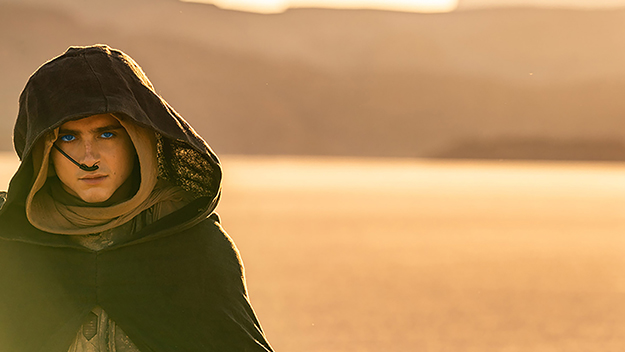Spice Boys
This article appeared in the March 1, 2024 edition of The Film Comment Letter, our free weekly newsletter featuring original film criticism and writing. Sign up for the Letter here.

Dune: Part Two (Denis Villeneuve, 2024)
Ambitious, talented, über-earnest Denis Villeneuve must be in thrall to the super-drug in Dune. He begins Dune: Part Two with a black screen: suddenly, a stentorian voice proclaims the galvanizing force of “Spice.” As subtle as a cattle prod, this audio coup reminds the audience (how could we forget) that Dune’s space empire runs on sci-fi fairy dust. Occasionally cinnamon-flavored and always addictive, this magical powder turns brown and green eyes blue and expands (or blows) the mind. Under its spell, Duke Paul Atreides (Timothée Chalamet) envisions multiple futures and cosmic navigators gain the prescience to pick their way through deep-space corridors and alleyways. Anyone who controls the Spice-producing desert planet of Arrakis—and, crucially, its giant sandworm Spice-makers—dominates the entire universe.
This ostentatiously dynamic, numbingly literal sequel continues Frank Herbert’s best-selling eco-saga from the final moments of 2021’s Part One. Escaping the slaughter of House Atreides, Paul and his “witch” mother, Jessica (Rebecca Ferguson), part of the super-intelligent sisterhood known as the Bene Gesserit, have hooked up with the indigenous and indomitable Fremen of Arrakis. The two deposed aristos and (in Herbert’s words) “the renegade people of the desert” share a hideous enemy: the sadistic Harkonnen clan, led by an evil baron (Stellan Skarsgaard) who refused to relinquish Arrakis to the Atreides and now plans to squeeze the planet’s men and resources with an iron fist in a black latex glove. Out in the sticks, the religious indoctrination squad of the Bene Gesserit has convinced the Fremen to believe in a savior who will liberate them and make their planet bloom. Jessica becomes their Reverend Mother.
Thanks to his Spice-induced visions, Paul—an unholy blend of Moses, Muhammad, Jesus Christ, and T.E. Lawrence—knows that (a) he’s destined to usher in a messianic age and (b) embracing this role means leading the Fremen to apocalyptic combat. When the elders anoint Paul their Messiah, the younger Fremen, including the female warrior Chani (Zendaya), whom Paul loves, dismiss it as a white-savior fantasy. With Chani’s support, Paul resists becoming the Fremen’s warlord/prophet—until he doesn’t.
Villeneuve only hints at what’s kicky or campy about Herbert’s Dune: the feverish mysticism, the comic-book romanticism, the Dark Age valor and minstrelsy. Unfortunately, he shapes the storyline to fit his dual penchants for gigantic compositions and relentless punishment. The novel’s devotees can read whatever they want into the film. On its own, it’s just an attenuated parable about galactic elites imposing their conflicts on a poor developing planet. Naturally, Villeneuve and his cowriter Jon Spaihts give Chani greater agency than Herbert did in 1965—she’s now Paul’s political conscience, applauding him as an adopted Fremen, then scorning his abrupt (and unpersuasive) transition into interplanetary player.
This pop rendering of settler colonialism may seduce impressionable audiences, but even they should cry “cop-out” when Villeneuve declines to flesh out Paul’s fear of holy war, which Herbert refers to as “jihad.” Villeneuve rests all these weighty matters on Paul and Chani’s wispy cross-cultural romance. Elemental, though, does a better job of pairing a water-boy and a fire-girl—at least in that (actual) cartoon, when the lovers embrace, they boil and sizzle. Here it’s embarrassing watching Chalamet make puppy-love eyes at Zendaya and hearing her say that he must stop looking at her like this. Although Chalamet improves as the film goes on, Villeneuve’s inability to dramatize Paul’s internal conflicts makes the star come off more emo than ever. We learn more about Paul when he simply ticks off on his fingers the number of futures he sees than we do from Villeneuve’s hokey montages of Paul’s visions.
The movie’s ensemble resembles a hipster’s version of the all-star casts in old-time Biblical epics like The Greatest Story Ever Told, with Christopher Walken popping up as the Emperor and Dave Bautista returning as Harkonnen thug “Beast” Rabban. The female supporting cast, clad in Jacqueline West’s sumptuous, imaginative costumes, often radiates a runway charm. There’s Florence Pugh as the Emperor’s daughter, looking chipper in her medieval-futuristic headwear. Oh, and here comes Léa Seydoux, exuding sexy swank in her elegant Bene Gesserit gowns.
Villeneuve’s self-important tone protects the actors from bad laughs when they spout unreadable lines. Herbert’s ear was not made of Spice, but tin. Has there ever been a battle cry more generic than, “Long live the fighters?” Or a pre-duel challenge less witty than “May thy knife chip and shatter?” Villeneuve and Spaihts keep their “original” dialogue simple, with unhappy results. Chalamet at one point refers to “guys” (a word not found in Herbert’s book).
Happily, Javier Bardem goes full Anthony Quinn as Fremen chieftain Stilgar—with captivating gusto, he finds the humor in commands as basic and retro as “Woman—come with me!” Even better, Austin Butler, the embodiment of manly virtue on Apple TV’s Masters of the Air, sleekly personifies perversion as Baron Harkonnen’s favorite nephew, Feyd-Rautha. His muscular yet serpentine presence inspires Villeneuve’s ace artisans (along with West, cinematographer Greig Fraser, and production designer Patrice Vermette) to imbue a gladiatorial contest with the baroque optics of a bullfight. We avidly anticipate the climactic fight between Feyd-Rautha and Paul: what magnetizes this Dune film is a grudge match between Spice Boys.
Frank Herbert called the Spice “mélange,” evoking not just the powder’s multiple narcotic powers but also his own trippy vortex of history, culture, science, and religion. Villeneuve sticks to plain and simple “Spice” but brews a visual mélange from the leavings of DeMille, Lucas, Spielberg, Kershner, Boorman, Coppola, Lean, Lang, Eisenstein and, alas, Riefenstahl. Unlike their epic dreams or nightmares, Villeneuve’s eclectic jamborees of eye-catching set pieces and bristling action lack visionary clout and emotional staying-power. In the final act, when at long last we see wide shots of Paul and his mates hurtling a troika of Godzilla-sized sandworms toward opposing armies, the scene is awesome in scale and virtuosity, but it doesn’t tingle the spine like the moment in Jaws when the shark leaps into sight and jolts Roy Scheider into saying, “You’re gonna need a bigger boat.” Dune: Part Two’s modest echoes of Lean’s Lawrence of Arabia are agreeable enough, but this movie’s battles waged on sand can’t compare to the battles on ice in Kershner’s The Empire Strikes Back or Eisenstein’s Alexander Nevsky. Despite the similar iconography of scrappy freedom fighters and over-armored invaders, we miss the soul-stirring orchestration and vivid choreography that would provide them with more than a frisson or two.
J.R.R. Tolkien, no Dune fan himself, gave readers sound advice about approaching “fairy stories” based on existing legends: quoting George Webbe Dasent, he counseled, “We must be satisfied with the soup that is set before us and not desire to see the bones of the ox out of which it has been boiled.” Frank Herbert spiked his bouillon with Abrahamic and Eastern religions, “consciousness-raising” techniques and drugs, and larger-than-life fables, from Siegfried slaying the dragon to King Arthur founding and losing Camelot to Robin Hood turning from aristocrat to champion of the poor. The author hooked millions with his loopy high-pulp concoction. Even those of us who find it lumpy appreciate the fun that hordes of fans still have with Herbert’s Dune.
Sadly, Villeneuve practices the fine art of reduction on this stock but loses too much of its flavor. Inside his glittering high-tech tureens, all audiences get is thin soup.
Michael Sragow, a Film Comment contributing editor, wrote Victor Fleming: An American Movie Master (Pantheon, 2008), wrote and co-produced the 2019 documentary Image Makers: The Adventures of America’s Pioneer Cinematographers, and co-wrote and co-produced the 2022 documentary Fiddler’s Journey to the Big Screen.







